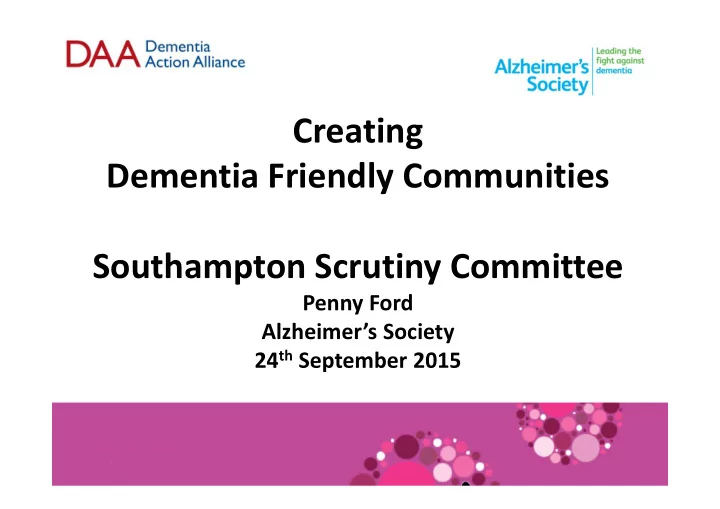

Creating Dementia Friendly Communities Southampton Scrutiny Committee Penny Ford Alzheimer’s Society 24 th September 2015
Why take action on dementia? • 850,000 people with dementia in the UK by 2015, predicted to be 2m by 2051 Southampton 2500 • £26.3 billion per year (£11.6 billion unpaid care) • 51% carers in work • Two thirds of people with dementia live in the community • A cause of concern for large proportion of population – high on news agenda ________________________________________________________________________________________ dementiaaction.org.uk alzheimers.org.uk
D Building a Dementia Friendly Community A wide range of organisations, all working to become dementia friendly, through awareness raising, reviewing current practices and adapting to meet the needs of people living with dementia Local Dementia Action Dementia Friends : Alliance : Steering Group of A national initiative to local stakeholders working raise awareness with organisations and There are 1.3 million People businesses to support and Dementia Friends living encourage them to take nationally, with a target for with actions to work to become a further 3 million by 2020. dementia dementia friendly.
10 Key Areas Involvement of people with dementia, Including understanding demographic variation, the needs of people with dementia from seldom heard communities, and the impact of the geography, e.g. rural versus urban locations . Challenge stigma and build understanding including in seldom heard communities and increase awareness and understanding of dementia Accessible community activities that are specific and appropriate to the needs of people with dementia and existing leisure services and entertainment activities are more inclusive of people with dementia.
10 Key Areas Acknowledge potential so that people with dementia themselves acknowledge the positive contribution they can make to their communities. Practical support to enable engagement in community life, including practical support to ensure people with dementia can engage in community life as well as offering emotional support. Respectful and responsive businesses and services Encourage organisations to establish strategies that help people with dementia use their business.
10 Key Areas Ensure an early diagnosis: and post-diagnostic support. Integrated services delivering person-centred care Community-based solutions Support people with dementia in whatever care setting they live: their own home, care homes, sheltered housing to prevent people from unnecessarily accessing healthcare and live longer in their own homes. Building dementia friendly communities – a priority for everyone (Published 2013) show that a year living in the community with dementia (excluding initial memory service assessment) is estimated to cost £24,128 (including integrated health and social care package, together with respite, therapies and medication). A year in residential care costs an average of £35,424. Therefore a saving of £11,296.
10 Key Areas Consistent and reliable travel options: bus, train, air and ferry travel. Supporting the transition when people can no longer drive. Easy-to-navigate environments – High streets, shopping centres, supermarkets, local shops, sports grounds, museums and tourist attractions
Foundation criteria for annual self-assessment DFCs can demonstrate: 1 Right local structure to maintain a sustainable dementia friendly community 2 Person to drive forward the work to support your community to become dementia friendly 3 Have a plan to raise awareness about dementia in key organisations and businesses 4 Develop a strong voice for people with dementia living in your communities 5 Raise the profile to increase reach and awareness to different groups in the community 6 Focus on a number of key areas that have been identified locally 7 Plan or system to update on progress There is also a requirement for a 6 monthly progress update
Future plans for Recognition Process Dementia Friendly Communities Recognition Process • launched in 2012 Target was 20 Dementia Friendly Communities by • March 2015. Currently 115 communities registered • Time to review our approach • – Clearer guidance on the journey and steps – Consistency on meaning of “Working to become dementia friendly” – Wider definition of community – Staged approach to raise the bar, with guidance on number of Dementia Friends in a community Still work in progress – currently consulting with • people living with dementia and registered Dementia Friendly Communities
Making a difference Fareham Security guards & cleaners in the shopping centre attended Dementia Friends sessions. Man lost his wife who has dementia, very worried. Guard circulated picture to all his colleagues. Wife found happily shopping. Guard took husband and wife for coffee. Dorchester A residential home is a “safe haven” for people with dementia who are lost and confused. The DAA connected them with the local Police. Any person who potentially has a dementia related illness who is lost is taken to the home rather than police station. Isle of Sheppey Dementia Café in school run by Year 11s and 12s. Special, seasonal events and fêtes which involve whole school. Bristol / South Gloucestershire Hairdressers with 20 staff have all attended DF sessions. They provide a quiet corner for people with dementia and take necessary time to pamper pwd and their carer. Chester Tesco has consulted with people living with dementia to create a checkout which aims to provide clarity and ease of use
Contact: Penny Ford Dementia Action Alliances Project Manager, South penny.ford@alzheimers.org.uk 07710 381679
Recommend
More recommend